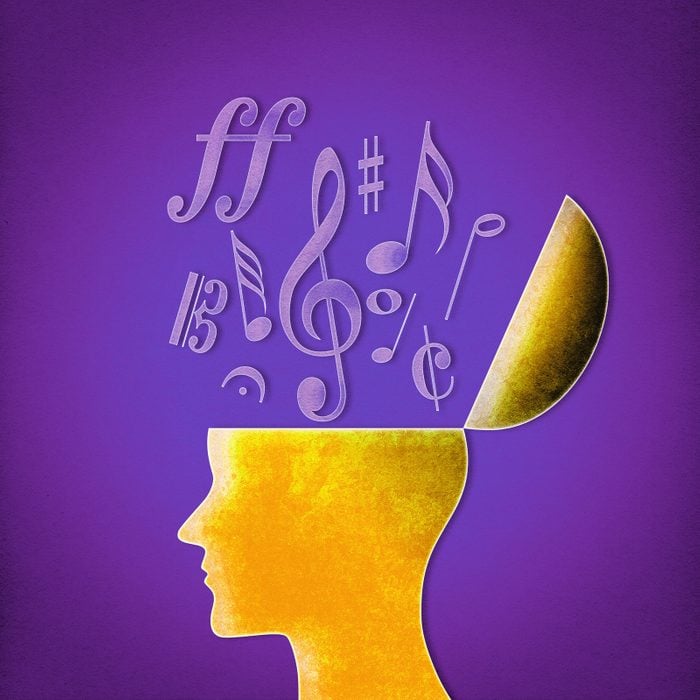Song Stuck in Your Head? Here’s How to Stop Those Pesky Earworms
Updated: Nov. 17, 2023

We've all had a tune linger in our head for much longer than we'd like. Here's why earworms happen—and what you can do to get rid of them.
As I write this, I have a Bob Seger song stuck in my head. I despised it when it came out decades ago, and I hate it with a fiery passion still. It popped up as the song playing over the closing credits of a movie I watched, and now it’s on torturous permanent repeat in my brain. Why, oh why, does an earworm happen?
We’ll get to that very soon, but first, a little history about them. According to the Kennedy Center for the Performing Arts in Washington, D.C., Germans coined the term öhrwurm—earworm—more than 100 years ago to describe the experience of a song stuck in the brain. It definitely wasn’t “Baby Shark” back then, but this problem clearly has been irritating people for a long, long time.
To help solve this musical mystery, I talked to music psychologists and scientists about one of the weird facts about the human body. Because even if it’s a funny song, that endless feeling of déjà vu can get really annoying in a hurry.
Get Reader’s Digest’s Read Up newsletter for more music, humor, cleaning, travel, tech and fun facts all week long.
What causes earworms?
Like the science of yawns, the reason for earworms is fascinating. They are a form of auditory imagery where we perceive tone in the brain in the absence of actually hearing it. “The auditory cortex is located in the temporal lobe of the brain,” says Samata Sharma, MD, director of addiction consult psychiatry at Brigham and Women’s Hospital in Boston, who has published research on this topic.
Earworms bore into both the side of the cortex that perceives music and the part that understands song lyrics. “When a familiar song is heard and suddenly stopped, these areas of the brain become overly activated in anticipation of hearing the rest of the song, and then it fills in the missing pieces,” she says.
The phenomenon is triggered by catchy tunes with simple melodies and subtly surprising rhythms. “Then, even when it’s quiet and in the song’s absence, the auditory cortex may remain active long after the song ends and replays the song,” says Dr. Sharma. “Usually the most memorable part of the song is the ‘hook,’ and this is then the piece of the song that gets replayed over and over again.” This is why commercial jingles are such an effective sales strategy.
Who’s at risk for earworms?
Susceptibility to earworms isn’t some kind of inherited trait, like your hair color. In fact, no one with hearing is immune to earworms, but there are a few personality characteristics that can make them happen more often. “People who score higher in the personality trait of openness to experience report more frequent earworms,” says Kelly Jakubowski, an associate professor of music psychology at Durham University in England. Jakubowski says one large study also found that women reported more frequent earworms.
You may have seen a viral TikTok recently of a guy saying earworms aren’t normal but are instead symptoms of ADHD or OCD. That’s generally not the case.
“It is entirely normal to experience earworms: Over 90% of participants in large-scale surveys report having had earworms at least once a week, and they are not a symptom of any other underlying mental condition,” says Jakubowski. “There have been some studies showing that people who are high in obsessive-compulsive traits report more frequent and disturbing earworms, and there are clinical cases of related experiences like musical obsessions and musical hallucinations, but these are on the whole much less common than everyday earworms.”
Are certain songs more likely to become earworms?
Absolutely, and Jakubowski conducted a large and detailed study on that. Her research of pop songs found that earworms are “more likely to be upbeat [faster-tempo] songs and are more likely to have relatively generic melodic contours, like nursery rhymes,” she says. Songs that make large or frequent leaps in the musical scale can also bore into your brain and stay there.
So which songs on your playlist are most likely to play on repeat in your head? According to Jakubowski’s findings, Lady Gaga’s “Bad Romance” tops the list. Other tunes with longevity included “Don’t Stop Believing” by Journey and, not surprisingly, “Can’t Get You Out of My Head” by Kylie Minogue.
Are there any upsides to earworms?
In fact, there are. Sharma says a recent study found that if a certain song is associated with a specific event in time and then replayed again one to four weeks after the event, those who go on to experience earworms have better recall of the details of the event. “So in a certain sense, that repetitive loop of the song being played over and over again in your head may be strengthening your ability to remember a past event in greater detail,” she says.
How to get a song out of your head
So back to my pressing dilemma: How do I get “You’ll Accomp’ny Me” out of my head? Aside from its relentlessly repetitive hook (with terrible lyrics), this love song doesn’t really fit the bill of the poppy songs that most often burrow into our brains. (Trust me, I would have preferred to have one of those on auto-repeat instead.)
Sadly, neither of the experts interviewed for this story had a long list of solutions to this problem. But here’s what they do know—and what I’ve discovered as I desperately try to get this earworm out of my mind.
Listen to the entire song
One thought process to get an earworm out of your head is to listen to the entire song from start to finish. “It can help your brain resolve the unfinished loop that’s causing the song to stick in your head,” says Jakubowski.
In my case, that solution was a hard no. I couldn’t bear the thought of listening to the whole lousy song again. But Jakubowski said that a study conducted by some of her colleagues found that listening all the way through a song can give you closure.
Distract yourself with another tune
That same research found that distracting yourself with another melody was a trick that works too. So pick one of these happy songs and drive that earworm out of your head.
Intrigued by the list of popular earworm songs, I decided that I’d much rather have Kylie lodged in my brain. I played her catchy, classic dance hit on Spotify, and it did embed itself in my brain for a while. What a refreshing change of pace! But a day or two later, Bob Seger was back, belting out his early-20th-century fantasy about escorting a woman to a barn dance.
Engage your mind in activities that require focus
Having a conversation with someone or getting involved in a cerebral activity can shift your mental focus from the song playing in your head. For days, I’ve tried hitting pause on my earworm and redirecting my thoughts to just about anything else. It didn’t help for more than an hour or two.
But you can also try solving puzzles or working math problems—if that’s your thing. Engaging your brain in a different way might help to push out the repeated song. But I can personally testify that writing an article about earworms does not help.
Chew gum
This tip has some bona fide science behind it. Chewing gum or eating something crunchy can engage your auditory senses and interrupt the song playing in your head.
“One experiment indeed found that chewing gum vigorously reduced the number of earworms the research participants experienced,” says Jakubowski. She said a few people still had them after trying that trick. I’m a mint person, so I didn’t have a pack of gum around to experiment with. Maybe “You’ll Accomp’ny Me” will accompany me to the convenience store?
Just accept it
Sometimes, trying too hard to get rid of a song can just make it lodge in even deeper. You may need to just deal with the fact that the song is there for this moment in time—even if you’ve hated it for decades—and it will eventually fade away. I’ve never once been accused of being a patient person, but I guess it’s finally time to start getting better at that.
So what worked for me?
About the experts
- Kelly Jakubowski, PhD, is an associate professor of music psychology and co-director of the Centre for Research into Inner Experience in the Department of Music at Durham University in England. She is also the author of several studies on the subject of earworms.
- Samata Sharma, MD, is the director of addiction consult psychiatry at Brigham and Women’s Hospital in Boston. She is the co-author of the published paper “Setting the Stage: Neurobiological Effects of Music on the Brain.”
Sources:
- Psychology of Aesthetics, Creativity and the Arts: “Dissecting an earworm: Melodic features and song popularity predict involuntary musical imagery”
- Crossroads of Music and Medicine: “Setting the Stage: Neurobiological Effects of Music on the Brain”
- American Psychological Association: “Psychologists Identify Key Characteristics of Earworms”



